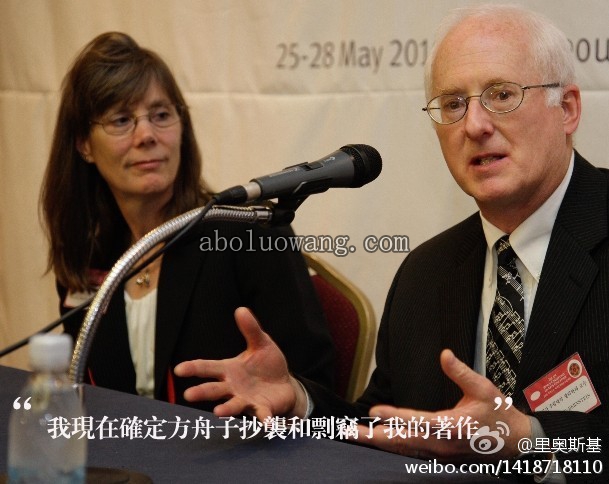|
|
寻正
1995年,方舟子在美国读研究生期间,抄袭其所在密歇根州立大学教授Robert Root-Berstein博士于1984年发表的“On Defining a Scientific Theory: Creationism Considered”(《界定科学理论:论创造论》)一文。该文全文未提及文字与思想来源,在亦明公开爆光之际,方舟子慌了手脚,半夜起来修改公布在网络上的剽窃作品,生硬地加入Root-Berstein教授的名字,以掩盖自己抄剽的事实。
这不是方舟子第一次被人指控剽窃,因此方舟子依仗自己惯常的绞辩伎俩以及中国国内媒体的配合,这件事情有大事化了的趋势,然而,方舟子遇到了一个愿意较真的美国教授。Root-Berstein教授其实也并非一定要较真,他对方舟子没有太多接触,愿意息事宁人,故而,在揭发方舟子的人把相关事实告之Root-Berstein教授时,最初Root-Berstein教授回信回避了直接指控方舟子。
在今年3月Root-Berstein教授回复刘实的信中称,他不能阅读中文,故而判断方舟子是否剽窃应由懂双语的人来进行。但Root-Berstein教授在回信中详细介绍了他的作品受版权保护,如果方舟子没有注明引用并指出他是原作者,就是剽窃,违背美国法律,侵犯了他的版权。
由于这封信中Root-Berstein并未直接指控方舟子剽窃,方舟子不敢出示信件原件,但从中抓取个别字句,强调Root-Berstein并未认可他剽窃的说法。亦明在向密歇根州立大学揭发方舟子剽窃时,密歇根州立大学认可剽窃指控,但以方舟子作品与毕业论文无关的技术性理由放弃了追查方舟子的责任,密歇根州立大学相关官员显然采取了袒护方舟子的立场。这某种程度上激起了Root-Berstein教授的义愤。方舟子对他在密根大被检举事件不以为耻,反以为荣,觉得自己取得了一次胜利,得意之中透张狂,处处炫耀美国教授“他从来没有认定我抄袭其文章”。
方舟子是一个自大狂,张启发的转基因食品严重损害了他的判断能力,任何一个稍有正常智力者,只要有双语基础,都可以判断出方舟子的剽窃行为,但他却可以真心地认为自己没有剽窃,或者认为他有能力糊弄所有的人。方舟子在极力漂染加工抹去他抄袭Root-Berstein教授的文章的痕迹后,他托朋友提交给Root-Berstein教授。他不满足于Root-Berstein教授放他一马,回避直接指控他抄袭的结果,他还要Root-Berstein教授给他的剽窃行为发一个烫金的许可证。可能三天前方舟子仍然在梦想,Root-Berstein教授向不勤于思考的中国人发信,表明细读方舟子的英文译作,发现方舟子科学地阐述了相关理论,无愧于密根大优秀毕业生的称号。
又一次美梦变噩梦跟转基因无关(或许有关?),方舟子等来了一个炸雷。下面是Root-Berstein教授对刘实的回信,同时寄达方舟子及其名下的新语丝:
亲爱的刘实博士:
您寄给我的是我收到的方博士文章的第四份译文。这之中三份来自相信方博士剽窃了的人,另一份来自方博士的朋友,宣称凭之可以证明方博士没有抄袭。实际上,所有的译文,包括方博士朋友递交的那一份,都跟我的文章在语言上极其相似,都是使用了同样的论点,采用了同样的例证。大量的语言、所有的论点、以及几乎所有的例证,都逐字抄袭了我的文章,并未在文中注明论点、语言、以及例证的来源。因此,在这里,我确认方博士剽窃了我的作品。
我再强调两点。一是在国际版权法下,不仅一篇文章的确切语言受到保护,其思想结构与支撑它的系列例证也同样受保护。毕竟,设计思想结构以及组织证据维护之同样是独特的智识劳动成果,跟发明的那些具体语言以传递这些思想一样。第二,我要再次强调方博士宣称科普写作不受版权法限制的说法是彻头彻尾错误的。一个人普及科学(或者任何其它话题)跟原始学者一样地需要注明他或她的来源,或者提供其它方式让读者认识到该普及文章基于什么原始材料。作为例子,您可以查看我及我妻子Michele Root-Berstein在当代心理学(Psychology Today)网站上关于创造性的普及博客文章([www.psychologytoday.com])。
此致,敬礼
Bob Root-Berstein
附:Root-Berstein英文信件原文:(详见刘实博客原文)
Dear Dr. Shi Liu,
Yours is the fourth translation of Dr. Fang's essay to have been sent to me. Three have been from people who believe that Dr. Fang is guilty of plagiarism; one was from a friend of Dr. Fang's who claimed that the translation he sent me proved that Dr. Fang was not guilty of plagiarism. In fact, all of the translations, including the one from Dr. Fang's friend, are extremely similar in language and all lay out an identical argument using exactly the same examples. Much of the language, all of the argument, and the vast majority of the examples are drawn verbatim from my essay, which is not cited as a source of the argument, the language or the examples. I am now, therefore, convinced that Dr. Fang has plagiarized my work.
Let me add two important points. One is that under international copyright law, not only is the exact language of an essay protected, but so is the structure of the argument and the set of examples used to bolster the argument。 Devising the argument and marshaling the evidence to support it is, after all, just as much a form of intellectual work yielding unique intellectual property as is the crafting of the specific words used to convey the argument. The second point that I want to reiterate is that the Dr. Fang's claim that popularizations are exempt from copyright is absolutely false。 An individual who popularizes science (or any other subject) is under just as much obligation as is the original scholar to cite his or her sources or provide other means for the reader to determine what original sources were used in writing the popularization. As an example, you can look at the popular blog on creativity that I write with my wife Michele Root-Bernstein on the Psychology Today website: [www.psychologytoday.com]
Sincerely yours,
Bob Root-Bernstein |
-

|